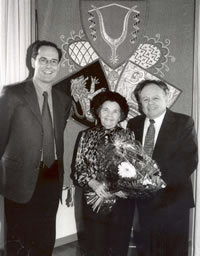by Harry W. Ebert

Harry Ebert with his wife Hanni and the mayor of Dachau during their 50th wedding anniversary reception, 1997. Harry and Hanni were married in Dachau in 1947 when he was stationed there with the US Army’s War Crimes Commission.
After Kristallnacht, Holland was one of the few countries that accepted Jewish children who were trying to escape from Hitler’s Germany. They permitted Dutch citizens to bring individual children across the border, and they permitted Kindertansports to bring unaccompanied children into the country.
While my two younger sisters were picked up at our home in Mannheim by a Dutch friend in Nov ember 1938, I boarded a train on the 17th of Jan uary 1939 that pulled into the Rotterdam Quarantine Station two days later. The Station, which was guarded by Dutch soldiers, became a reception center for refugees of all ages. We were housed in comfortable large permanent barracks and ate in a central mess hall. The food was quite good and I enjoyed the beschuit (round zwiebacks) with chocolate-butter for breakfast and lungen stew for the dinner. We were restricted to the Station, but could receive visitors. The Kinder were well behaved, however, we were bored as there were no scheduled indoor activities and it was too cold to play outside.
After a few weeks in Rotterdam, some of the Kinder and several teachers were transferred to Gouda where we stayed in an old orphanage . This was a well organized and productive arraignment and food and housing were quite satisfactory. The Kinder performed most of the house cleaning chores, and we received intensive and effective instruction in a wide range of academic subjects. Since we had many good teachers, we received personal attention in subjects in which we showed interest. (I credit this schooling for my being able to graduate with honors from a US High School on my 16th birthday).
In Gouda, we got involved with the town and its people. We played soccer against local boy’s teams, and we swam and skated at nearly lakes (but not on the same day). We even could get permission to go into town and to visit people over the weekend. I was very lucky and mobile since my parents were able to send me my bike. This enabled me to visit friends in the nearly town of Bodegraven and more importantly, my sisters, who were staying with a family in Loosdrecht and were attending the well known Werkplaats School in Bilthoven. (The present Queen of the Netherlands attended this school after her family returned from their WW2 exile in Canada).
When biking, I tried to hang on to slow moving milk trucks; this illegal but common practice was less tiresome and easier than peddling all the way. On the way to Loosdrecht, I passed through the town of Breukelen (the original name of Brooklyn).
After Gouda, I was transferred for a short time to the Amsterdam Quarantine Station which acted as a refugee holding center. Since we were not restricted to the center, I was able to take in the many sights of the city. One of my favorite places was the Colonial Museum (now the Tropical Museum) where I learned a lot about what is now Indonesia , and f our decades later, I had the opportunity to visit that country several times .
My last stay was at the agricultural and vocational school at Wieringen which was located on land that had been reclaimed from the small inland sea called IJsselmeer (formerly the Binnenzee and Zuiderzee). . Here, in addition to receiving some academic instructions, we developed team work while harvesting beets, repairing drainage ditches that had been damaged by cattle and repairing furniture. I was most impressed by the system employed for the collection and utilization of the swamp or natural gas that bubbled up in the canals and ditches. I consider my stay in Wieringen an enriching and pleasant experience.
On the 12th of April 1940, a lady from a refugee care committee took my sisters and me to the pier in Antwerp where we boarded the SS Westernland for our trip to the US. My father joined us in Southampton and, since World War II had started, the ship dodged floating mines. We found a new homeland in the US and did quite well. All three of us earned Master of Science degrees, and had professional careers. I received national recognitionas the principal welding engineer for an international oil company, published many papers, received a Fellowship and other national awards and recognitions, and have consulted and taught in 22 countries. I also served in the US Army with assignments in Germany supporting war crimes trials and security missions. I continued in the Reserve and retired as a Colonel.
In closing, I wish to express my family’s thanks to the Dutch people and to the Dutch government for the help and friendship they extended to us.